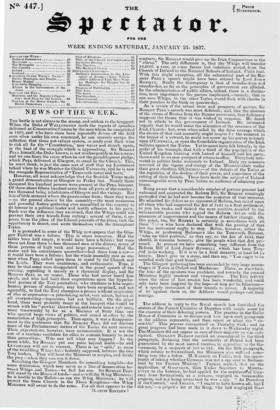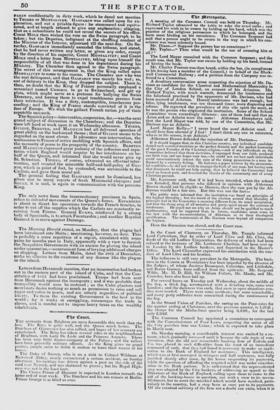The address in reply to the Royal speech has furnished
the orators of the French Chamber of Deputies with ample scope for the exercise of their debating powers. The practice in the Gallic House of Commons is to discuss and vote upon each paragraph in the address separately, and then reject or adopt. the " en- semble." This process commenced on Thursday week ; and no great progress had been made in it down to Wednesday night. The Ministers did not appear as sure of their majority as was anti- cipated. OD1LLON BARROT carried an amendment to the third paragraph, declaring that the nationality of Poland bad been guaranteed by the most sacred treaties, in opposition to the Go- vernment, by a majority of 189 to 181. On the fifth paragraph, which relates to Switzerland, the Ministers also suffered some- thing very like a defeat. M. BARROT, on Friday, took the oppor- tunity of asking whether Cotsssio was not a spy sent to Switzer- land by the THIERS Ministry ? TRIERS replied, that on the application of GASPARIN, then Under Secretary ta MONTA- LIVET in the Interior, he had applied for the expulsion•of CON- nu. from Switzerland, as a refugee, engaged in treasonable projects, and not being aware that he was a spy. " As President of the Council," said 'lamas, " I ought to have known all, but I did not,"—a palpub'e hit at the King, who had employed GAS• PARIN confidentially in dirty work, which he dared not mention to TRIERS or MONTALIVET. GASPARIN was called upon for ex- planation, and cut a pitiable figure : he stammered and equivo- cated, and at length refused to give any explanation ; alleging, that as a subordinate he could not reveal the secrets of his office. Count MOLE then wished the vote on the Swiss paragraph to be taken ; but the Deputies, indignant at the shuffling conduct of the Minister of the Interior, adjourned till the next day. On Sa- turday, GASPARIN immediately ascended the tribune, and stated, that he had never written any letter, or given any order, except by the direction of his superior, Count MO:VTALIVET; and Count MOLE read a letter from MONTALIVET, taking upon himself the responsibility of all that was done in his department during his Ministry. The Chamber then agreed to the Swiss paragraph. The secret of this arrangement is, that the King called upon Mostra LIVET to come to his rescue. The Chamber saw who was the real delinquent, and that GASPARIN was merely his tool; so, out of delicacy to the King, they dropped the subject. There is, then, no doubt that the King of France personally employed a scoundrel named CONSEIL to go to Switzerland, and get up plots, which might serve as a pretence for bullying the Swiss Directory, and forcing them to expel troublesome persons from their territories. It was a dirty, contemptible, treacherous pro- ceeding ; and the King of France stands convicted of it in the face of Europe. We wish the gallant French nation joy of their reputable monarch.
The Spanish pol icy—intervention, cooperation, &c.—was the next grand subject of discussion in the Chambers; and the Deputies were left hard at work upon it on Wednesday afternoon. TRIERS, BERRYER, and MAUGUIN had all delivered speeches of great ability on the hackneyed theme ; that of GUIZOT seems to be regarded as the most clever. It advocates nonintervention, the uselessness to France of active meddling with Spanish affairs, and the necessity of peace to the prosperity of the country. BERRYER and MAUGUIN expressed great jealousy of the influence and repu- tation which England would acquire by her interference on be- half of the Queen, and intimated that she would never give up St. Sebastian. TRIERS, of course, advocated an effectual inter- vention, awl scouted the miserable half-and-half-policy of GUI- ZOT, which in point of fact, he contended, was serviceable to the Carlists, and gave them moral aid. The general feeling that GASPARIN must be dismissed, has given rise to many reports of fresh Ministerial changes; and Sot LT, it is said, is again in communication with the precious King.



























 Previous page
Previous page